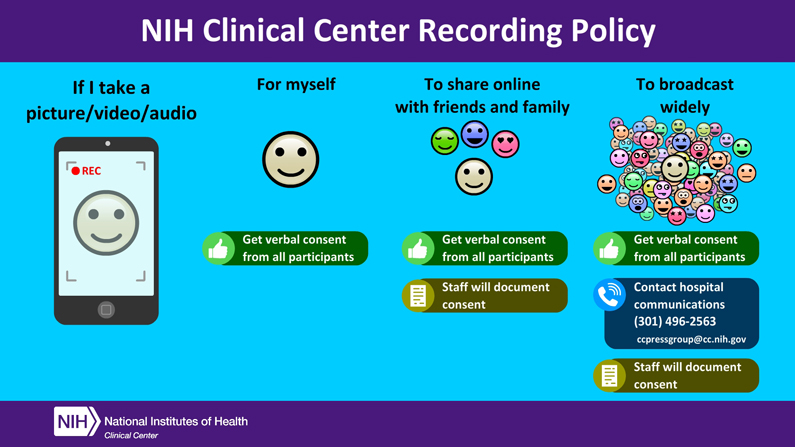Hospital adopts policy for patient recordings

Social media is a huge part of American life with 500 million tweets posted each day and 221.6 million Americans using Facebook in 2020. Add in easy access to technology with smartphones in most people's pockets and people are connected online in unprecedented numbers.
In fact, many NIH Clinical Center patients share their medical journeys through social media and personal blogs for months or even years prior to coming to campus. Once here, it's totally understandable that patients - who come from all over the world and often have relatively long lengths of stay - wish to capture their experiences at NIH through recordings, providing updates and sharing special moments with family and friends. The Clinical Center is well recognized for its patient-centric environment of care.
However, this also makes it necessary to apply common sense guardrails around recording activity to ensure the hospital meets its obligation to protect the privacy and safety of patients, caregivers and staff (as well as in rare circumstances to protect data integrity of studies).
To address this, the Clinical Center is socializing a new policy that provides guidance for patients in the hospital who want to record their experience. The policy is two-fold: it focuses on consent of the people involved and the potential reach of photos, video and sound taken at the Clinical Center.
The policy states "that no audio, video or photography recording of patients, visitors or NIH staff take place without the knowledge of and consent of all involved participants."
What this means is if a patient plans to record their interaction with staff, they need to communicate that desire, and understand that in some cases the recording activity may not be possible.
Further, patients are asked to communicate how the recording is intended to be used, for example strictly for personal use like a memento photo with a favorite staff person upon discharge versus recording something to be shared in a widely read blog. Depending on the intended use, staff may need to document that the recording is taking place.
There will be shades of grey, and the success of the policy ultimately depends on the cooperation of all involved.
Importantly, this policy is not intended to stop recordings that help patients correctly follow clinical care instructions. Recordings may improve a patient's recall and understanding of medical information and enhance the ability to capture important information for family members and caregivers.
The policy: CC Administrative Policy C-003: Photographs, Audio and Video Recording by Patients or Visitors in the NIH Clinical Center – can be found online (Staff Only).
Questions?
Contact the NIH Clinical Center Office of Communications and Media Relations by phone at (301) 496-2563 or by email at CCCommunications@nih.gov.
- Justin Cohen and Donovan Kuehn